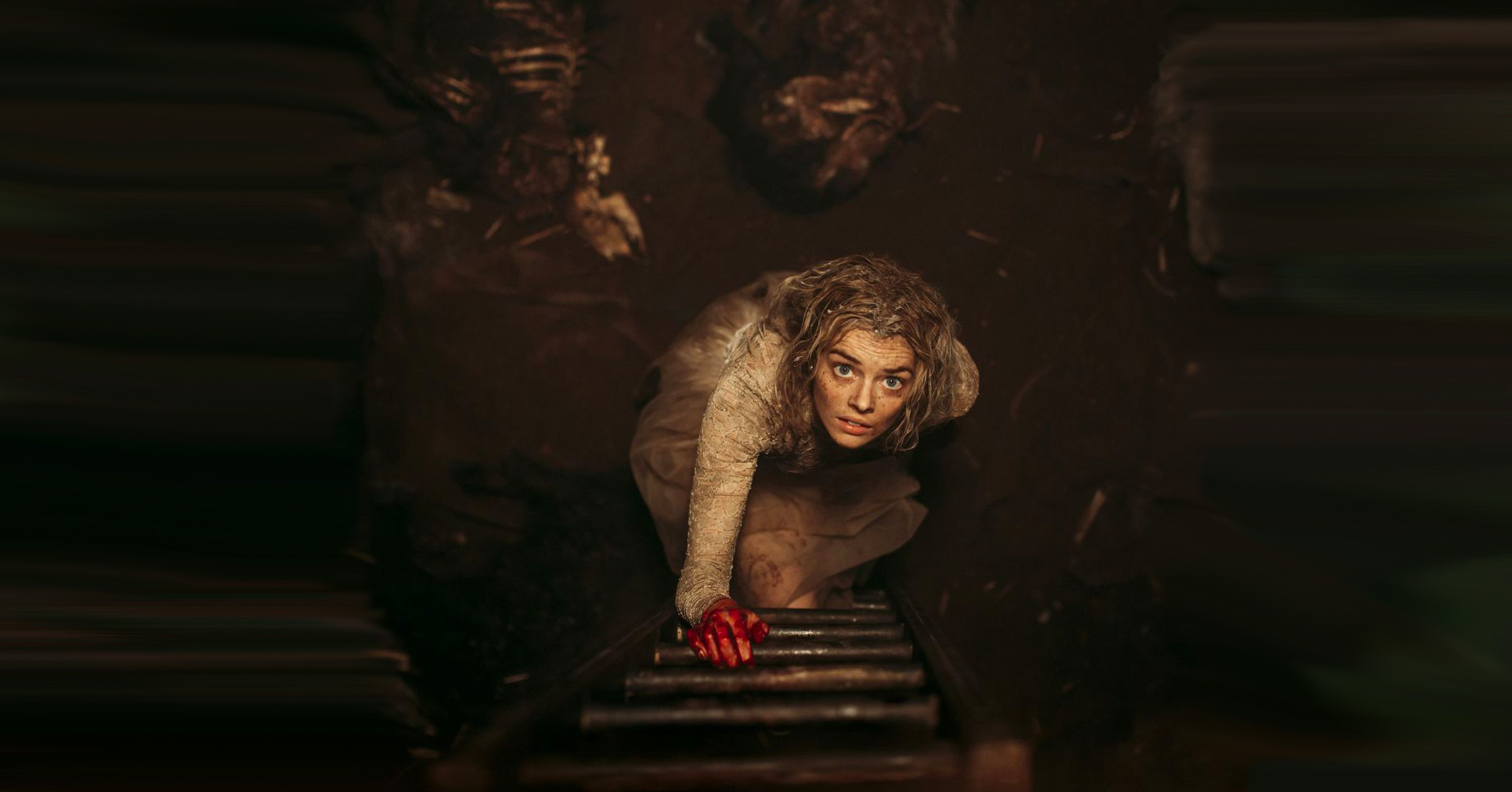How Ready or Not escaped The Hunt's fate
A movie where wealthy elites hunt poor people that wasn't canceled amid partisan outrage


A free daily email with the biggest news stories of the day – and the best features from TheWeek.com
You are now subscribed
Your newsletter sign-up was successful
You may have heard that a satirical movie about wealthy elites hunting commoners for sport — in which their game is derailed by a blond avenging angel, who hunts them instead — was canceled. On the basis of a single trailer — and the phrase "nothing better than going out to the manor and slaughtering a dozen deplorables" — Fox News condemned it, Trump tweeted about it, and the movie was withdrawn.
Yet while The Hunt was canceled because it too explicitly adhered to red-blue political divides — pitting billionaire liberal elites straight out of a Josh Hawley fever dream against a cadre of Real Regular Americans — it's interesting to note that Ready or Not, another riff on "The Most Dangerous Game" in which the aristocratic hunters eventually become the prey, premiered without incident this week. Ready or Not lacks on-the-nose political reference points. Grace (played to the gory hilt by Samara Weaving) marries into the Le Domas family — who subsequently hunt her — but the Le Domas family resembles the Obama-voting family of Get Out as much as they do the miscreants on Succession (while all we learn about Grace is that she grew up in foster homes). The family estate where the movie takes place could be anywhere; it was filmed, as it happens, in Ontario.
I haven't seen The Hunt — other than a few test screenings, no one has — but the satire was apparently meant to be explicit and even-handed: "Our ambition was to poke at both sides of the aisle equally," director Craig Zobel said; "It's up to the viewers to decide what their takeaway will be." I hope we get to see it eventually, but it's easy to see how they got themselves into trouble: It's hard to satirize stereotypes of "Red" and "Blue" states without bringing those stereotypes to life, or accepting the underlying fallacy that there are precisely two kinds of Americans, incompatible and mutually exclusive. The country is more complicated than red-state coal miners and blue-state college professors, after all: if the average "red" voter is from the bible belt, he's as likely as not to be in an upper-income tax bracket; if the average "blue" voter is urban, she might be a nurse, changing bedpans. I suspect that The Hunt's fate might show what trying to please and offend everyone equally gets you: there's nothing in the middle of the road, as Jim Hightower once put it, but yellow stripes and dead armadillos.
The Week
Escape your echo chamber. Get the facts behind the news, plus analysis from multiple perspectives.

Sign up for The Week's Free Newsletters
From our morning news briefing to a weekly Good News Newsletter, get the best of The Week delivered directly to your inbox.
From our morning news briefing to a weekly Good News Newsletter, get the best of The Week delivered directly to your inbox.
With the exception of a somewhat disappointing ending — which I'll get to in a minute, spoiler warning — Ready or Not is actually a very pointed and effective satire, political because it isn't "political." The Le Domas family doesn't particularly want to murder and ritually sacrifice Grace. They like her, and at first, they mostly do their eccentric best to welcome her into the clan. But because their intergenerational wealth supposedly stems from a century-old deal struck with the devil, there is a family tradition that each new member of the family must play a randomly-selected game on the night of the wedding. Most of the time it's something innocuous, and the family spends a quiet evening bonding over cribbage or monopoly; about once a generation, the card they draw is "hide and seek," at which point the family uses antique weaponry to hunt down and ritually sacrifice the victim.
When Grace draws the "Hide and Seek" card, the most dangerous game begins. And from that point on, Ready or Not is an effective horror-thriller, tastefully gory, fast-moving, and with a good sense of humor. At one point, Grace catches sight of herself in the mirror — with tennis shoes, a ripped and filthy wedding dress, and a rifle and bandolier of ammunition — and after a beat to allow a Tarantino-primed audience to be impressed with how bad-ass she looks, she spits out an appalled expletive. It's a hilariously anticlimactic moment: she looks awful and feels worse.
In the trailer for The Hunt, we hear the protagonist — an apparently military-trained Mississippian bad-ass — declare, with righteous fury, that "Of all the people you kidnapped, of all the people you killed, you picked the wrong gang." It sets a tone for that movie; "elites" hunting "regular Americans" and deplorables Making America Great Again by killing the elites seem equally hateful and self-assured. There's no equivalent to this line in Ready or Not. Instead, as Grace's desperation escalates over the movie's brisk runtime — and you can, without complication, emphatically root for her to survive her wedding night — the movie never quite becomes vengeance: the last thing she wants to do is kill anyone.
For their part, Grace's would-be murderers have neither zest nor aptitude for the job. From the reluctant brother-in-law googling crossbow instructional videos — while sitting on the toilet — to the variety of guns that misfire, don't go off, or hit the wrong person, part of the point of this movie is that no one really wants to commit murder, or is good at it. It's unpleasant, and hard work. Most of the movie's considerable body count is accumulated awkwardly, even haphazardly. The servants die first, two shot by accident and two mangled in machinery as Grace struggles to escape; the servants die first because the family doesn't really want to kill her, and send their hirelings to do it instead. And though she does eventually smash several of her in-laws to death, her primal struggle to survive leaves her traumatized, shocked, and hysterically desperate. She lives — not a spoiler, because you knew she would — but as a near-catatonic mess, shivering and broken.
A free daily email with the biggest news stories of the day – and the best features from TheWeek.com
Killing is not fun, this movie insists, over and over again. It's actually pretty gross and unpleasant.
What makes this movie an effective satire, then, is all the convoluted explanations that the Le Domas family goes through to justify what they're doing (in what turns out to be a very talky action movie). They have to kill her, they insist — they don't want to, but it must be done — which means they aren't really, themselves, bad people. It's tradition! It's family! She's an outsider, ultimately, and if they have to sacrifice her for the good of their own, well, of course that's what they have to do. In other words, in contrast to the ideological caricatures that apparently populate The Hunt — lusting for each other's blood in a demographically predetermined grudge match — Ready or Not is filled with the weak-willed and selfish. They're nice people, generally. They don't kill because of their beliefs or ideology or even an inclination to violence. But if they take part in the occasional, unpleasant liquidation of an outsider, they do so because it's part of the rules, part of their club. This game what people like them do — including, in one of the movie's more interesting choices, the servants — as part of a system that desensitizes otherwise "nice" people to violence. It's a rite of passage, and what better rite of passage for a lifetime of wealth and privilege than occasionally liquidating a commoner?
What could have made this movie an almost perfect satire is the path not taken at the very end. According to the rules — and to the folk wisdom of the wealthy class, it being implied that there are many families like this one — if Grace survives until dawn, the family's devilish benefactor will exercise the "eradication clause," and kill the entire family. That this threat hangs over the heads of everyone born into the family, and into this contract, incentivizes them to follow the rules and play the game. They have no choice, if it's true. But since none of the family have ever seen their satanic benefactor — the deal having been struck long before any of them were alive — they bicker over whether it's even real, whether this tradition is actually based in anything (and which rules can be changed and altered and updated). Until the end, the tradition is nothing but a story that the family brings to life, as a mark of what makes the rich "different" than normal people. And so, at the end of the movie — when the curtains are thrown back, revealing the sunrise that Grace has survived to see — there's a moment, a beat, in which the family waits for its destruction ... and it doesn't come.
"I knew it was bullshit!" someone yells.
This would have been an amazing place to end the film. It would have done more than just undercut the ludicrous premise, bringing a preposterous film down to earth in a wonderfully ironic way. Such an ending would imply that the ludicrous caricatures we imagine into existence to justify our preposterous wars with each other are, actually, just the pretexts we want and need to justify violence. In other words, it would skewer movies like The Hunt, and the ideological fantasies that divide the country into red and blue caricatures. If The Hunt seems to take a side — endorsing, by all indications, the worldview of its "deplorable" protagonists — Ready or Not nearly ends by suggesting that the stories we might tell ourselves to normalize violence are nonsense.
Instead, as it turns out, the deal is real, as is Satan, and after a suitably sadistic delay, the family's benefactor exercises the eradication clause, leaving a blood-spattered Grace abruptly alone in a burning house. I confess I was a little disappointed; it would have been satisfying to see the family receive their moral comeuppance, to realize that the true Satanic horror had always been in their ability to go along with atrocity and to justify it by a clannish and false division between insiders and outsiders. Alas. I suppose that would have deprived audiences of the pleasure of seeing them all die, which would have broken a different contract, the rules of the genre. And I can't deny that it's a pleasure to see all of it burn.
Aaron Bady is a founding editor at Popula. He was an editor at The New Inquiry and his writing has appeared in The New Yorker, The New Republic, The Nation, Pacific Standard, The Los Angeles Review of Books, and elsewhere. He lives in Oakland, California.
